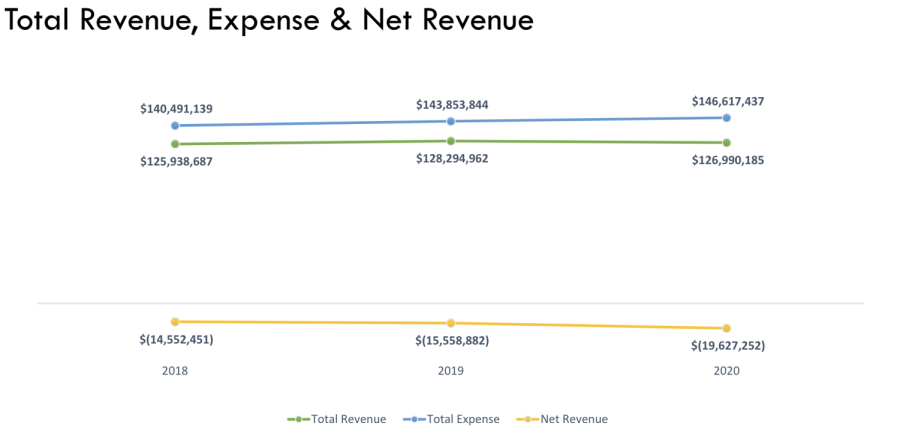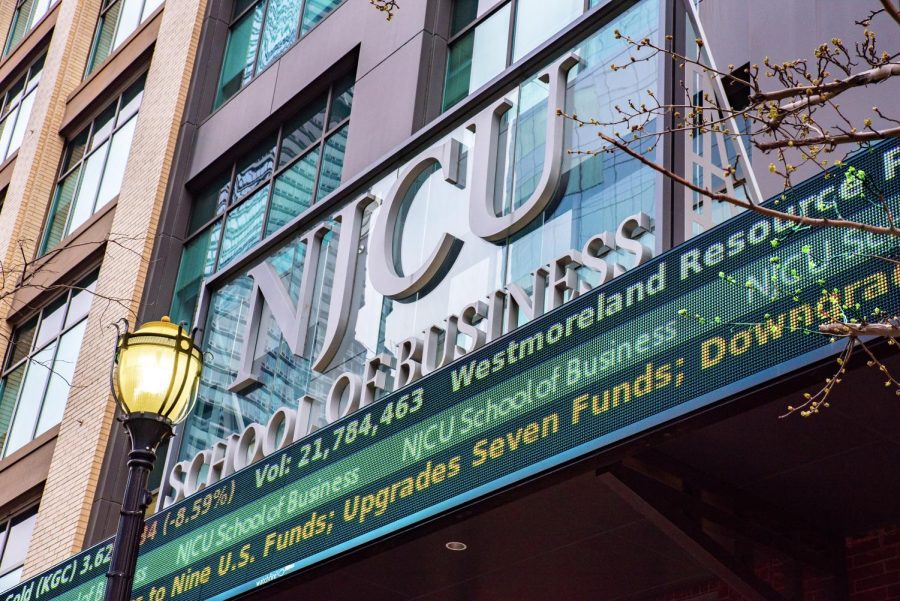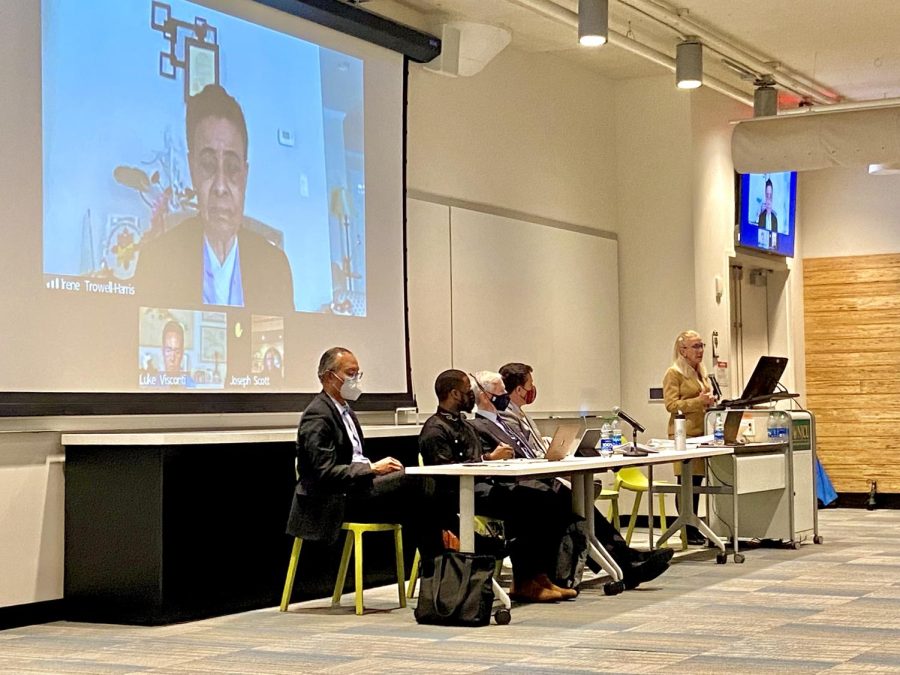First Board of Trustees Meeting Back in Person
University Finances, Enrollment Outlook, and More
Board members during the February 22 Board of Trustees meeting. Photo by Haresh Oudhnarine.
February 23, 2022
Yesterday the NJCU Board of Trustees had its first in-person meeting since the pandemic began in a fairly empty lecture hall at the School of Business. Even though it was in person, four board members attended the meeting through Zoom.
Some people questioned why there wasn’t a virtual option for the public to attend the meeting, which was held at 2:30 in the afternoon.
Thyquel Halley, the president of the Student Government Association and a voting student trustee on the board, addressed the inconvenience of not having a Zoom option available for the public. Halley said, “I think we should be more mindful and cautious about the time and location where we are holding our Board of Trustees meetings.” At least one faculty member also questioned this earlier in the day.
Halley also said, “I want to address the board publicly and just say that we should do a better job. I sit here disappointed in the board and the leadership of the board.”
Board member James A. Jacobson explained that the reason the meeting was held at the School of Business was to accommodate for the pandemic. The Board of Trustees webpage notes that public meetings will be held on the main campus at 6 pm “unless otherwise indicated.”
Andres Acebo, secretary to the board and chief of staff to President Sue Henderson, said that it was announced at the September board meeting that this one would be in person.
Acebo said the board meetings are typically coordinated a year in advance with the schedules of the board members. Acebo said, “The date, location, and method of this meeting was coordinated, taking everyone’s schedules into account. Even prior to the pandemic, there were practices where trustees who had very busy schedules were permitted to call in or using the technology of the day, Zoom, to facilitate that even more so. Your point is well taken that we should be more mindful on how we engage the campus.”
Other topics discussed included a deficit at the university, enrollment predictions for next year, and diversity projects. This was also the first board meeting since the vote of no confidence against Henderson in late September. The Board of Trustees is the highest governing body at NJCU. Early in the meeting, board chairman Joseph F. Scott pointed out that all of the board members are “volunteers.”
The Financial Status of the University
Concern about NJCU’s fiscal status has been a major topic of conversation on campus in recent months. It was one of the driving components for the vote of no confidence against Henderson from the University Senate.
Jim White, the chief financial officer (CFO), said during the board meeting that as of January 31, the university has a deficit of roughly $1 million. In simple terms, a deficit means that NJCU is spending more money than it is bringing in.
In 2020, NJCU had a notable deficit of $19.5 million.
In late November, the rpk GROUP also reported on the $19.5 million deficit from 2020, a figure confirmed by the CFO. (The rpk GROUP is a consulting firm that was hired by NJCU to do an efficiency study on the university for $210,000.)
When it comes to finances, the AFT Local 1839 union, which represents many professors and employees at NJCU, hired Red Maple Economics to “assess the financial stability” of the institution. Red Maple corroborated the $19.5 million deficit from 2020. They said they were unable to report on the 2021 fiscal year without the 2021 financial statements.
The rpk Study
According to rpk, the deficit grew by more than $5 million over the three years they studied (2018 to 2020). Rpk also called NJCU’s situation a “structural deficit” because there have been consistent decreases in the school’s net position.
Katie Hagan, a senior associate for rpk, said during the “academic efficiencies” presentation in late November, “Because the institution lost money, everybody is going to lose money because we have to spread that operational costs across all departments, so you’re gonna see everyone ending up in the negative because the institution overall is in the negative.”
Rpk said that half of the indirect spending in 2020 was from athletics, enrollment management, and the School of Business. Hagan said, “Those are the three biggest areas. I will say that those things are not necessarily negative things. Just because they cost more doesn’t mean it was a bad investment. It is just important institutionally to make sure you’re tracking those return on investments.
“If you are spending more on enrollment, are you getting more students? Are you getting a different type of student? Are those students staying longer? Are they retaining better or are they completing at a better rate? Those sorts of things.”
At the “administrative services” presentation in mid-January, rpk said that NJCU was able to balance its budget for the first time in six years with the help of government pandemic funding. The report said that without the additional government funding for COVID, the university would still have a $19 million deficit.
Henderson’s “Fall 2021 Update” stated, “In 2021, NJCU utilized additional COVID funding of $21.7 million including scholarships, direct student support and lost revenue.”
Rpk also said that NJCU has double the number of managers compared to similar-sized institutions.
The firm made many recommendations during the “administrative services” report for how NJCU can make improvements.
After the vote of no confidence against Henderson, NJCU put out a statement on September 28 which said that the university had a $6 million surplus on June 30, 2021, which was the last day of the fiscal year.

The Future of the University
In the past few years, NJCU experienced a downward enrollment trend and negative impacts from the pandemic.
In the February “Academic Connections” newsletter sent to faulty members, Provost Tamara Jhashi said that NJCU’s four-year graduation rate of 18 percent is “unacceptable” and urged faculty members to join her in finding solutions. Jhashi also said that the American Council on Education’s Learner Success Lab will be working with NJCU this semester to address retention and shorten the “time-to-degree.”
Since Henderson became president, the four-year graduation rate increased substantially from 7 percent in 2014 to 18 percent in 2021.
Regarding the financial future of NJCU, White said during the board meeting that it is difficult to predict where the university will be by the end of the 2022 fiscal year (June 30), but that it is likely that there will be a break-even or slight surplus.
Barbra Hildner, an English professor and president of the AFT union, spoke towards the end of the meeting. She cited that William Paterson University fired roughly 40 percent of its faculty due to financial challenges. Hildner said that she is glad NJCU is moving in the opposite direction and not firing faculty members. She said that faculty are important and it is “counterproductive to limit faculty.”
Speaking with Hildner after the meeting, she said, “I have great hope for the university” and that she wants the university to make better decisions as it embarks on its second century in a few years.
The Enrollment Outlook
NJCU is not the only college that has had enrollment challenges. It is an issue that many colleges and universities are facing, primarily because there are simply fewer people who are college-aged in the United States than years prior.
Ben Rhodin, the vice president for enrollment management, gave a report on enrollment projections for the next school year. Undergraduate enrollment is on tracking 6 percent ahead of 2021 this time last year, with graduate enrollment being up by about 5 percent, according to Rhodin.
Rhodin explained that NJCU has been doing more recruitment in the Hudson County area as well as introducing new strategies to attract more out-of-state students. He said that in 2022, the university will be monitoring the locations where students are interested; so far, a majority are from the east coast with some in the mid-west.
In 2021, Rhodin said that enrollment was down by around 8 percent compared to 2020. He also said that the Garden State Guarantee will take effect in Fall 2022 which will provide financial assistance for students whose family income is up to $80,000. NJCU students have the lowest family income of all New Jersey four-year institutions, according to Rhodin.
According to the data on the NJCU website, undergraduate enrollment has seen decreases every year for the past six years, from 6,663 students in 2016 to 5,262 students in 2021.
The Red Maple report pointed out that enrollment challenges on top of expansion efforts from the university added to its financial strain.

Other Updates
There was no mention of the vote of no confidence against Henderson.
The next Board meeting will be on April 25. This will include the tuition and fees hearing for the next school year. Acebo noted that this does not indicate there will be another tuition increase, but that it will be discussed.
During the meeting, Henderson presented a university update that included student success initiatives, notable achievements from athletics, and upcoming events from the Music, Dance, and Theater program, Joffrey Ballet, the Center for the Arts, and more.
Henderson said that there will be a report coming in April with updates on how the university is adapting the recommendations from rpk.
There have been workshops from rpk with department chairs and deans.
Chief Diversity and Inclusion Officer, Angel Gonzalez, gave a report on Black and Latinx student success initiatives. This included opportunities for student engagement, a campus-wide push to celebrate diversity, alumni mentors, and more.
Board chairman, Joseph F. Scott, said, “Student success is our number one priority” during his report at the start of the meeting.













Cris • Feb 25, 2022 at 7:04 am
As a parent, I am disappointed to hear the comment about the managers. The food is limited with one dining hall still not open, the west campus building is in need of so many repairs with my daughters window still cracked and held together by tape and one of her 5 hour classes is still virtual. I reached out to the President and was nicely told they couldn’t help me and to seek out each department. What happened to the buck stops here? And speaking of bucks, I think the kids pay quite a high price for housing and food that doesn’t equal the value. This is where you need to start focusing if you want to increase enrollment. Quality of life on campus needs to be more of a priority.
Ellen Garvey • Feb 24, 2022 at 12:01 pm
Extraordinary that even Rpk, hired by managers, admitted that” NJCU has double the number of managers compared to similar-sized institutions”. That should be the obvious place to cut. Anyone want to take bets on whether they do?